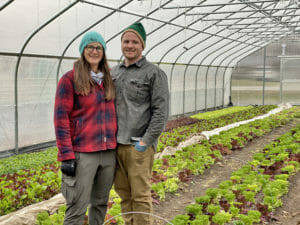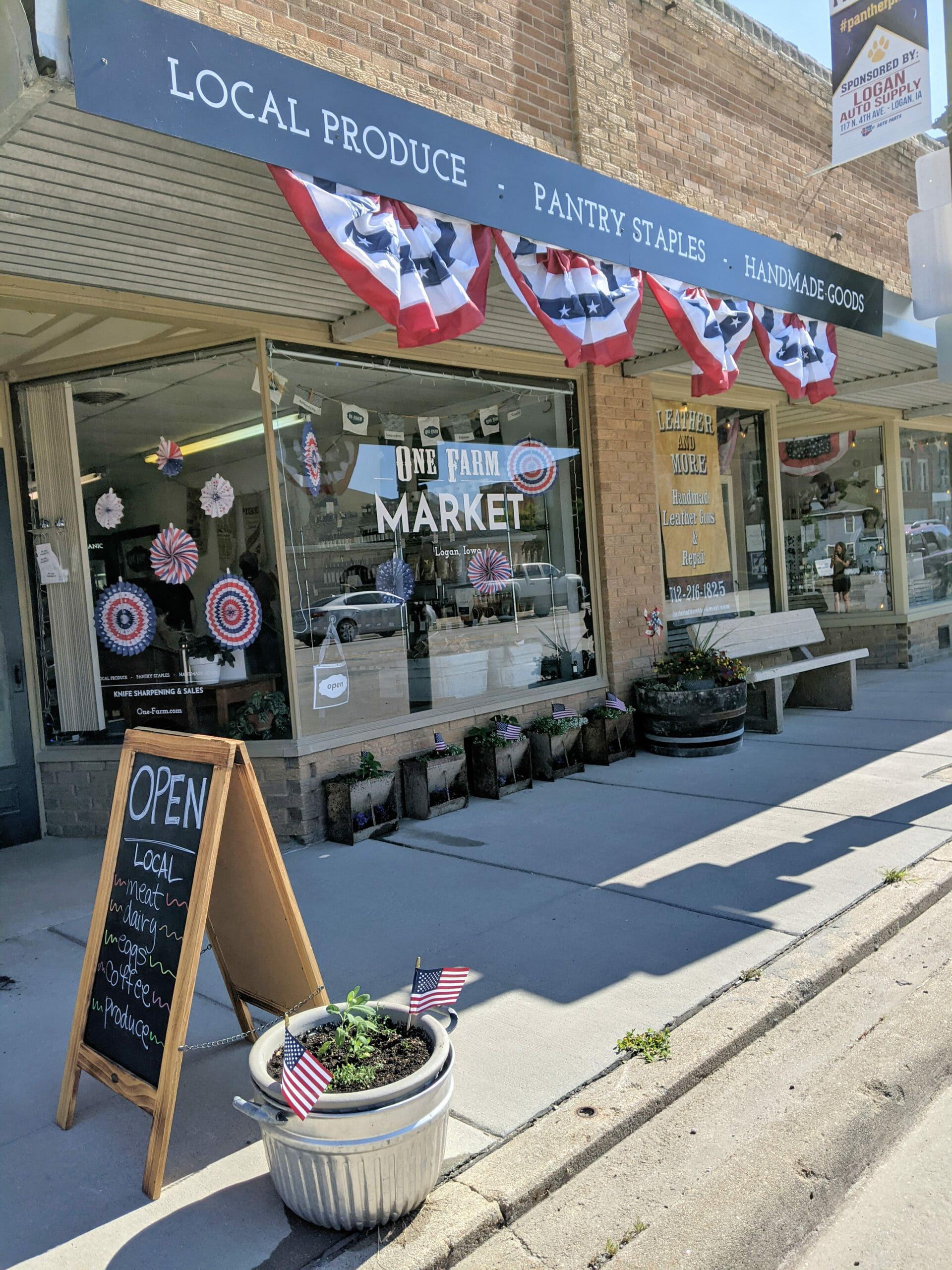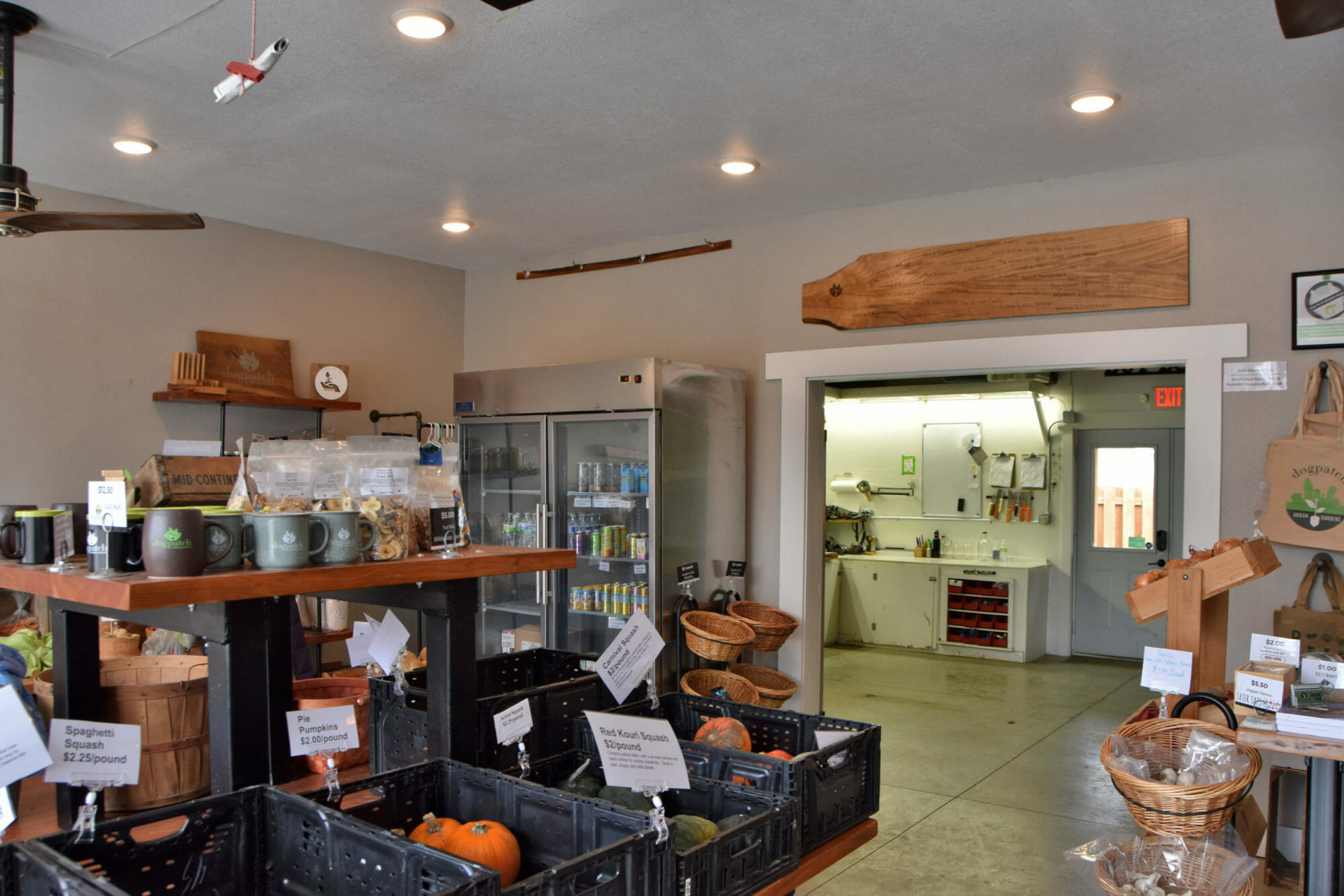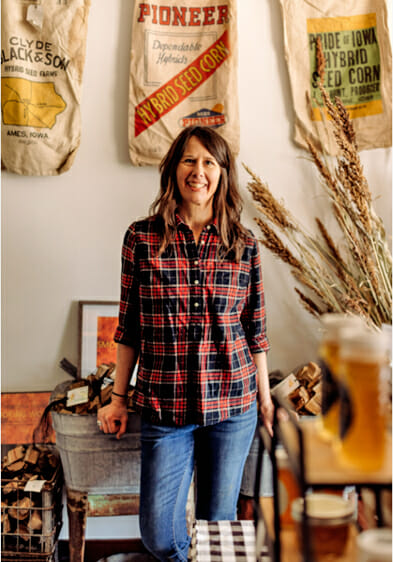Growing Community
Jenny Quiner, of Dogpatch Urban Gardens in Des Moines, Iowa, started a farm to grow her community. Danelle Myer, of One Farm near Logan, Iowa, discovered her community because she started a farm.
Brick-and-mortar shops helped them build connections between land and people. Today, their storefronts are sources of personal fulfillment, valuable market streams and platforms to not only grow their businesses – but to let creativity and community blossom.
Urban Oasis

Jenny Quiner and her husband, Eric, stand inside their farm’s high tunnel during a November 2019 PFI field day.
When Jenny Quiner started her farm, Dogpatch Urban Gardens, in 2015, her dream was to bring community pride and food security to the Des Moines neighborhood where she lives. In addition to fulfilling their needs, she wanted to give her urban neighbors a space to get to know their farmer and their food. Opening a shop along with the farm just made sense. Today, Jenny uses organic principles and sustainable methods to grow produce on a few acres. Her production is sufficient to fulfill a range of market streams. Customers can buy from Dogpatch Urban Gardens at an on-site farm store she calls the FarmStand, at Des Moines’ Downtown Farmers Market, seasonally from the farm’s sweet corn stand around the corner from the FarmStand or online.
Of all these direct-market sales streams, the FarmStand is the one Jenny talks about most passionately. “Building relationships with the community is one of the reasons we started our business,” Jenny says. “At this point, I can tell you who will be in my shop, when and for what – and I can also tell you about their lives and their families. And everyone feels like they’re a part of my family and my life, and they want to support me.”
“Food is a uniting thing for so many, and we are able to facilitate that and get to know each other more deeply.”
– Jenny Quiner
Situated in a 900-square-foot pole barn she built for the purpose, the space contains the on-farm store in one half and her washing, packing and crop storage area in the other. Operating the FarmStand has not been without challenges, however, as the business falls under two different regulatory frameworks: a food establishment license and retail food license. To accommodate all of her aims for the retail space, Jenny had to bring Dogpatch Urban Gardens up to code for public restrooms, compliance with the Americans with Disabilities Act and commercial kitchen management. This added more delays – and cost – such as installing concrete with a correct slope. Once she met those requirements, however, she says her business opportunities greatly expanded.
“The raw kitchen allows us to have a chef on site eight to 10 hours a week, so we can offer things made from our produce, like hummus, chia pudding, pickled beets, fresh salad, grab-and-go options and salad dressings,” Jenny says. “We even do four farm-to-table dinners per year at the farm.”
With so many options now available to her, Jenny has found that having clear goals has become especially important. As the FarmStand – and the rest of her business – keeps expanding, Jenny hopes to maintain that small-scale, local vibe. Over time, she has adjusted hours to find a balance between customer needs and maintaining a quality, well-stocked store.
Despite these changes, the FarmStand remains core to Jenny’s vision for Dogpatch Urban Gardens. With a range of offerings aggregated from local producers across central Iowa, as well as educated, knowledgeable staff, the FarmStand is doing its job of bringing food to the people, building community pride and helping people know their farmer and their food. “Food is a uniting thing for so many,” Jenny says, “and we are able to facilitate that and get to know each other more deeply.”
Small-Town Convenience
Danelle Myer started One Farm in 2011 on her family’s land just outside her hometown of Logan, Iowa, in western Iowa, where she grows chemical-free produce in a system that uses “the three Cs” – compost, crop rotation and cover crops. The farm name reflects Danelle’s intention to make a difference. As she states on the farm’s website: “Every little thing matters. And when we want change, little things become big things through repetition. One step, one new venture, one person, one small brave act can transform your life, your health and your general attitude and well-being.”
In late 2020, she launched a new venture: a seasonal pop-up market in a vacant space on Main Street in Logan. Strong community support led her to extend the agreement into a one-year lease in the brick-and-mortar shop – One Farm Market. On its opening day for the 2021 season, Danelle says customers completed one transaction every three minutes for the entire four hours the store was open. In fact, some would-be customers left because the shop, which occupies a previously vacant storefront on Main Street in Logan – population 1,600 – was overflowing, with the line out the door.
In March, she took off on a trek across the state in search of local food and Iowa-made products. She met producers and retailers, built relationships and brought back a diverse range of shelf-stable, useful and unique items for her shop. She has found that the diverse product mix – and convenience of getting things in one place – is important to her customers. The shop’s clientele are largely from the town of Logan, as well as from the broader Harrison County area in southwest Iowa. A few come from nearby Omaha, or chance to see the shop as they’re driving on U.S. 30 as it winds through town. “People who never come to the farmers market, where we’ve sold for years, are coming to the store,” Danelle says.
Starting the market scratched an itch Danelle didn’t know she had. After almost 10 years of farming, she finds herself flexing some muscles she hasn’t used since her previous career in marketing and public relations. Launching a brick-and-mortar shop for Iowa farm products has continued to draw on these skills and opened new doors for her. “Every day is different, and every day I’m learning something new,” Danelle says. “I enjoy the store in ways I never enjoyed the farm.”

In December 2020, Danelle launched her new brick-and-mortar store, One Farm Market in downtown Logan.
However, like Jenny, she found one of the biggest learning curves was navigating the regulations that applied – or didn’t apply – to her business. Danelle was intimidated by the process, but found the staff at the regulatory agencies wanted her to succeed, which made a world of difference. “Once I made the phone calls to the appropriate people,” she says, “establishing the relationships was easy.”
Growing One Farm Market has changed Danelle’s vision for her farm. For instance, she now wants to grow 20 things instead of 100, with more intentional thought about which crops she can grow most successfully and which are more cost-effective to source from other farms. Looking back at the last year, Danelle feels the store has made what she was already doing at the farm more visible to people in her hometown. It has also brought her closer to the community she serves while helping her build valuable and meaningful relationships.
“I know my town better now than I did when I was growing up here,” she says. “I love to interact with people. I love building relationships with other makers, I love spotlighting people who may not otherwise get attention with my customer base, I love telling other people’s stories and I love building value in those stories.”
While the store can be demanding, Danelle also finds it to be the perfect confluence of her professional experiences, from marketing and promotion to farming and management. “I’m doing this as long as it makes sense. It’s not perfect – I don’t want anyone to think it is– but the hope is for this to be the next big step with my business.”
“I know my town better now than I did when I was growing up here.”
– Danelle Myer
Indicators for Growth
So is operating a storefront a viable venture for an entrepreneur who also runs a vegetable farm and sells at farmers markets, wholesale outlets and online?
Danelle shared that her 2021 year-to-date numbers are up overall because of the store. She keeps a close eye on her profit margin, with a goal of between 27% and 30%. In June 2021, the store’s profit margin was over 50%. At that point, Danelle says produce sales weren’t booming but people were buying much more than just the One Farm produce. The convenience of the store and diversity of the other products had huge impact.
At Dogpatch Urban Gardens, those numbers are important indicators for Jenny as well. “As our ventures expand and our business grows,” she says, “it’s critical to make sure we’re always bringing in more than we’re spending.” Building out her space meant added capabilities to turn her produce into value-added products, and to host dinners and rent space to other businesses with commercial kitchen needs.
For both Jenny and Danelle, the pull of community, the joy of connection and the exhilaration of adaptation are common threads behind their inspiration to embark on a brick-and-mortar presence for their farm businesses. The shops reach to the core of why, how and for whom they each farm. Whether from an urban or rural perspective, growing food grows community.


